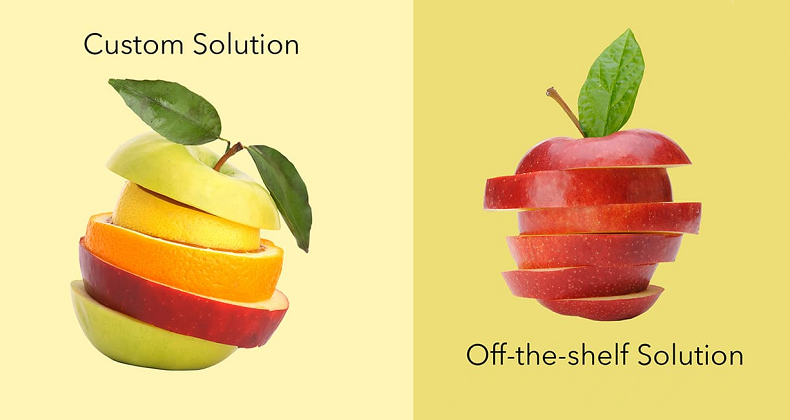Data integration has been a conventional IT process for decades. And, many organizations involving tons of data follow different data integration procedures. Big companies generate lots of data every day from multiple sources. So, a data integration solution is required when there is a need to integrate all sorts of client data. The solution should be capable of transforming and integrating the data into a presentable format. Besides, the source data can be either structured data or unstructured data. These incoming data in different formats can be handled by ready-made data integration solution. But what is the added advantage of a custom data integration solution over a ready-made solution? Continue reading to know the answers.
Overcoming challenges in the data transformation part
Data integration with readymade solutions cannot solve issues in the data transformation. It is necessary to opt a custom solution when there are complex business requirements. Here is the list of factors where custom data integration solutions gains the upper hand over readymade solutions.
- Business compliance: Data transformation may involve complying to the operational requirements of a business. For example, there would be a necessity to add production priority based on the criteria of a secondary data set. Additionally, there may be a requirement to do condition-based transformations.
- Response to failure in data processing: Custom data integration solutions can adapt the data processing when there are any intermittent failures.
- Varying file formats: Custom integration solutions can handle integration scenarios when the files are converted to different formats during the integration. They can validate the data processing and data merging process and ensure nothing goes wrong.
- Complex data validation scenarios: It is necessary to validate the data before the final loading process. Custom data integration solutions could only perform complex data validations based on dynamic computational codes.
Regulatory compliance to multiple standards
Different industries follow different compliance standards. Custom data integration services provide solutions to multiple compliance requirements. And, some of the regulatory standards include HIPAA, PCI DSS, HACCP, and ISO 27001.
Enterprises work across multiple industries and the client data flows from every possible direction. Any sort of data processing should be compliant to the multiple compliance standards involved. Readymade techniques cannot provide data integration solutions which require compliance to multiple protocols at the same time. This is where custom data integration offers tailor-fit solutions to diverse business requirements.
Business-to-Business (B2B) data integration
Data integration should be carefully handled especially when there is data exchange between multiple entities in multiple enterprises. An example of B2B data integration is business customers sharing their IT data with a logistics company to generate waybills automatically. Here, there may be a requirement to integrate external data by exchanging external documents. However, many organizations are unavoidably reluctant to open their business-critical APIs for a variety of security reasons. This document exchange usually happens in a loosely couple format, signifying the possibility of a difference in the customer files after each stage of the integration.
The integration solution would have to cope with millions of slightly-to-largely different documents from the millions of customers. Ingesting enormously unstructured data from such files would require custom scripts to transform the receiving data formats. But this problem gets even bigger when the situation scales up in a hurry. Here is where custom data integration solutions take the lead over readymade data integration solutions.
Handling issues with uneven IT expertise
Each organization extracting and sending data from their systems employs not only different IT solutions, but also different developers with various skillsets and expertise. Even if two organizations are using the same system to extract data, one organization may do the data transformation part while the other might not.
In the logistics company example, assume that the company transforms data before filtering and validation. The company sends only the data that is necessary, and ensure formatting, so there are no database errors.
An affiliated organization, however, might transfer raw data dumps including extensive PII. This will introduce a great responsibility on the shoulders of the destination company. And, any malicious or irregular data will go through without any modification.
When an enterprise receives the data of these two organizations and loads these two data-sets without any transformation, they would not only look out of order but also have high chances of corrupting the database. Custom data integration solutions meet the data needs irrespective of the IT expertise along the network.
Compatibility with conventional IT systems
Organizations that receive data from multiple sources need quick and efficient parsers to perform the data integration. Each client may need a separate parser, and each parser will require a set of data transformations, along with data verification.
Unfortunately, this is not an easy process. And, the conventional IT systems are not designed to perform integrations at this scale, nor do they have the necessary resources to handle such complex data transformations. Also, many companies have a false assumption that if their application can do API integration, then it can also integrate files. This leaves IT organizations designing complex and custom data integration solutions to the front end their in-house middleware, their data warehouse, or both. Such a custom data integration solution is required by enterprises with capabilities of real-time transformation. And, it is good to consider experienced data integration vendors to fulfill your custom data requirements.

